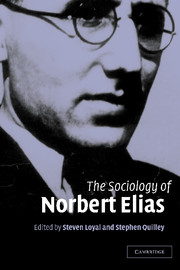Book contents
- Frontmatter
- Contents
- List of contributors
- Acknowledgements
- 1 Towards a ‘central theory’: the scope and relevance of the sociology of Norbert Elias
- Part I Sociology as a human science: Norbert Elias and the sociology of knowledge
- Part II Processes of stratification: figurations of race, class and gender
- Part III The formation of individuals and states
- 9 Not so exceptional? State-formation processes in America
- 10 Armed peace: on the pacifying condition for the ‘cooperative of states’
- 11 Changing regimes of manners and emotions: from disciplining to informalizing
- 12 Elias and modern penal development
- 13 Elias, Freud and Goffman: shame as the master emotion
- Part IV Religion and civilizing processes: Weber and Elias compared
- Index
- References
12 - Elias and modern penal development
Published online by Cambridge University Press: 22 September 2009
- Frontmatter
- Contents
- List of contributors
- Acknowledgements
- 1 Towards a ‘central theory’: the scope and relevance of the sociology of Norbert Elias
- Part I Sociology as a human science: Norbert Elias and the sociology of knowledge
- Part II Processes of stratification: figurations of race, class and gender
- Part III The formation of individuals and states
- 9 Not so exceptional? State-formation processes in America
- 10 Armed peace: on the pacifying condition for the ‘cooperative of states’
- 11 Changing regimes of manners and emotions: from disciplining to informalizing
- 12 Elias and modern penal development
- 13 Elias, Freud and Goffman: shame as the master emotion
- Part IV Religion and civilizing processes: Weber and Elias compared
- Index
- References
Summary
Introduction
Modern societies like to think of themselves as ‘civilized’. When they make this claim, it becomes a way of self-evidently distinguishing themselves from non-Western, uncivilized societies, which are then seen, given the teleological qualities that have now come to be associated with this concept, as being at a more primitive, less-advanced stage of social development. But what are the distinguishing features of a society that professes to be civilized? We can draw from a number of social indicators to demonstrate such characteristics: levels of health care, literacy rates, those for infant mortalities – and, as well, the way in which a given society punishes its offenders. What sort of punishments, though, make one society seem civilized, another uncivilized?
For those of us in the modern world, this question can perhaps be best answered by reference to what it is that strikes us as ‘uncivilized punishment’. This is likely to include excessive, brutalizing public punishments: floggings, stonings, amputations, bodies hanging from nooses – almost certainly, we think, ‘civilized people don't want to see that sort of thing’ (Smith 1996). Other identifiers of uncivilized punishment relate to squalid, corrupt and brutal prison conditions (in movie representations, they have come to be associated particularly with Thailand, Turkey and Viet Nam), which seem disgusting and degrading to our sensibilities. Others still involve shaming punishments of varying kinds, whereas in modern Western societies shaming punishments disappeared during the course of the nineteenth and twentieth centuries (Pratt 2002; Scheff this volume).
- Type
- Chapter
- Information
- The Sociology of Norbert Elias , pp. 212 - 228Publisher: Cambridge University PressPrint publication year: 2004
References
- 3
- Cited by



